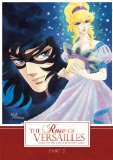| Reviews & Columns |
|
Reviews DVD TV on DVD Blu-ray 4K UHD International DVDs In Theaters Reviews by Studio Video Games Features Collector Series DVDs Easter Egg Database Interviews DVD Talk Radio Feature Articles Columns Anime Talk DVD Savant Horror DVDs The M.O.D. Squad Art House HD Talk Silent DVD
|
DVD Talk Forum |
|
|
| Resources |
|
DVD Price Search Customer Service #'s RCE Info Links |
|
Columns
|
|
|
Rose Of Versailles, Part 2: Limited Edition, The
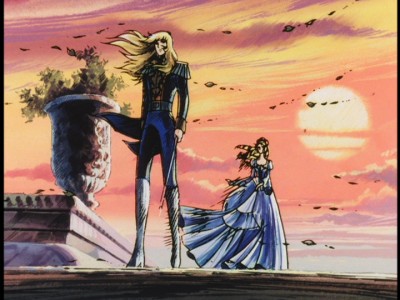
The Rose of Versailles is one of the greatest successes in shōjo manga ever created, and with the success of said manga (which debuted in 1972 and only ran one year until 1973), the storyline was later adapted into an anime series in 1979-1980 for Animax and Nippon television. The basic concept of the story was to craft a storyline focused around the French Revolution in animated form, focusing in on both the before and after of the events of this historic event; simultaneously telling a romantic story of fictional leading character Lady Oscar and her love Andre, while bringing historical figures like Marie Antoinette into the fold of the storytelling. Finally released in America by RightStuf's anime label Nozomi Entertainment, the show has been released in sequence with two DVD box-set's presenting the anime series.
The story begins with General de Jarjeyes having a meltdown upon realizing that his pregnant wife gave birth to a daughter instead of a son. Outraged at God, he believes that he should be able to have a son one way or another, so he decides to raise his daughter as a son instead of allowing her to grow up as a woman. Thus the story of Lady Oscar begins. She is raised in a manner where she is to be masculine in appearance and given the title of Commander of the Royal Guard when she is old enough. This doesn't, of course, change the fact that she is not actually a boy but her angry, vile father insists on raising her this way, and it leads Oscar to living a life of some confusion and internal conflict, especially when it comes down to her romantic feelings for a soldier which grows over the course of the show.
The animation on the show is rather impressive for the time period. Some of the absolute best animators of the time were working on the production, and sometimes the series is simply an immense marvel to look at visually. At other times, the opposite effect can happen though as many moments are slowly laid out through "snapshot" like frames of animation, which adds something unique to the visual aspect of the show but it also sometimes seems like it's just a shortcut to making the show a bit easier to produce. (For what it's worth, this feeling was in essence confirmed during a interview with director Osamu Dezaki included with the extras packaged alongside the second DVD set).
It is also a curiosity piece of a series because it's a series surrounding the French revolution. No doubt, some anime fans will want to tune in to experience an animated telling of some of these events. Just remember to keep in mind that some of these moments have been changed to less historically accurate elements. However, this series still manages to keep a lot of dates intact; preserving some historical accuracy and also some of the core concepts of the revolution. It doesn't completely fail as a history piece, but just don't watch it expecting total accuracy as something that could ever replace learning about the events separately. The series is also a romantic show with a lot of "made-up" elements that has everything to do with the writers creating the show -- that includes the series main protagonist and a lot of other elements in fictional storytelling.
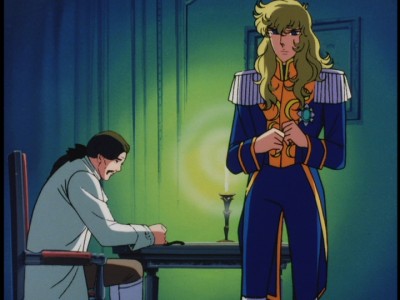
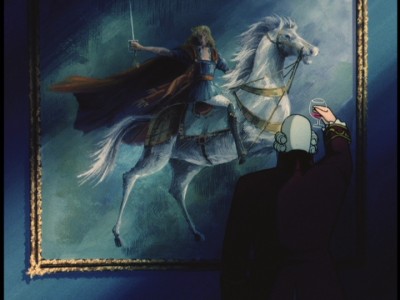
One of the things that makes the show stand out is the abundance of romanticized moments. Characters are frequently highlighted with animation to make them appear more romantic in nature and one of the most common things to happen on the show is to have sparkles used to emphasize different moments. This happens when characters are romantically embracing and surprisingly during other (less expected) moments, such as during some of the battle moments, during horse rides across the land, and other strange moments to focus on the sparkling element. Perhaps this is exactly what fans of shōjo anime want, but it feels over-the-top in a way that is a bit limiting on the series full potential; given the subject matter utilized. Nonetheless, it's clearly not on the creators minds.
I'm a fan of romantic anime series and shōjo work can be exceptional. I've never read the manga series though, and the anime version doesn't necessarily succeed in quite the way I hoped given how popular this show was in Japan. This certainly will appeal to a certain audience, but it is a creation that won't appeal as much to those who don't care for mostly melodramatic storytelling.
Unfortunately, I also found the show to be a bit boring in parts, and this is neither to do with the storyline or the concept: the animation and directing has moments where the beautiful quality of the work is well emphasized but it also slows down so much at times that the characters seem to actually be doing just about nothing and at a slow pace. There are really just far too many shots of the sky -- or birds flying -- or wind blowing, and all sorts of other unnecessarily emphasized elements which seems to be emphasized by both of the series directors, Tadao Nagahama and Osamu Dezaki. It's a bit irritating.
North American fans of Shōjo anime productions have no doubt heard a little bit about anime's earliest effort in the genre, The Rose of Versailles, before reading this review -- as often as it is discussed as being shōjo anime's start point. The series is definitely something that will appeal specifically towards fans of the genre the most. The series is abundantly over-the-top at times with characters breaking away during a number of scenes to say something for the audience (these moments are too brief to call monologues) and characters frequently repeat dialogue, especially when in regards towards romance and moments of life or death circumstances. It makes the series feel more melodramatic and soap-opera-y than historical and dramatic. It's disappointing because the show can make the distinction of being not only the beginning of shōjo anime but it is also one of the few historically based anime series of it's time-period; a distinction which remains relevant today.
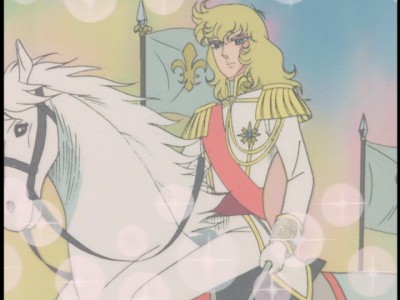
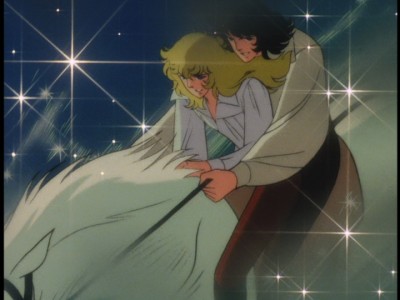
The Set (Part 2: Episodes 21-40):
The second half of the series The Rose of Versailles takes on a bit of a "different" direction in comparison to the first half of the series. This is the case both literally and symbolically, as it went through some changes artistically when the first series director, Tadao Nagahama, was gone from the show. The producers of the series spent a few episodes time looking to find someone to replace their previous director, and after a couple of director-less episodes the producers found their replacement in the form of director Osamu Dezaki.
Unlike Nagahama, Dezaki had a bit of a different view of how the show should be artistically. The direction of the series actually seemed to be a bit of an improvement when he joined the staff, but it's clear that he was still mainly a director-for-hire artistically. The series remained uninterested in being historically accurate and the basic concepts of the show's design were ultimately the same. However, Dezaki did seem to want to make the show a bit more of a dramatic show and a bit less of a soap opera style production and the characters became a slightly more invested element of the storytelling. He also toned down the use of 'sparkle' somewhat (though this aspect is still prominent on the show) and made the show a bit more grounded in certain scenes. However, in other moments, the series seems just as much of a fantasy as before, so... It's certainly a bit of a mixed bag as one can recognize that Dezaki wanted to bring in a slightly different style but not to radically differentiate from what came before on the series.
These episodes have two main elements to them storytelling wise: the first bulk of episodes focuses upon the storyline of the historical "Diamond Necklace Affair", and it alters a great amount of these details for the characterizations of the storyline. This story involves a plot against the Queen, a large sum of money, and jewels -- the storyline focuses on the events preceding and afterwards. As the series continues forward, the central element in the end episodes explores Lady Oscar's love for Andre, both of their troubling health issues that progress, and also Oscar's relationship to Rosalie. The relationship between Oscar and Andre is in many ways at the front and center of the ending.
Going into the final bulk of episode leads to further storyline progression and the main plot point of the ending is to piece together the historical events surrounding the French revolution and in relation to these main characters. The show follows revolutionaries of the French people and how they try to change the government. These episodes have a lot of battle sequences, revolutionary meetings, and lives lost as the battle for the people of France goes underway. It's all building to the major strides of the revolution.
The concluding episodes have some of the most dramatic elements of the series and it takes place around these elements and at the storming of the Bastille. What will happen to Lady Oscar and Andre? How these events unfold both historically and for the fictional (and also for some non-fictional) characters within the story is presented with these concluding moments.
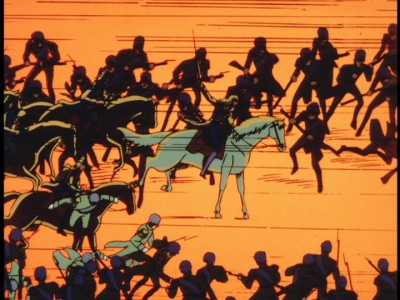
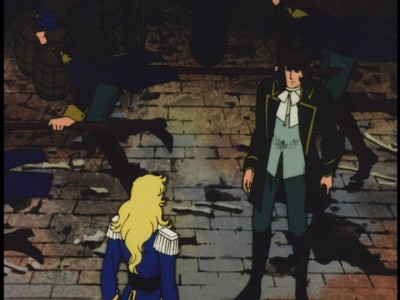
The DVD:
Video:
The Rose of Versailles is presented on DVD by RightStuf/Nozomi with surprisingly good transfers that suggests some restoration work was likely done, because colors and artwork throughout the show suggest a surprisingly clean and efficient presentation. There are still occasional moments where specks of dirt or remarkably minor print damage is visible; it's mainly consistently impressive though, and the show looks remarkably detailed and crisp considering the standard definition presentation. The impressive animation is beautiful to appreciate with these notable and enjoyable episode transfers, which are retained with the original aspect ratio of 1.33:1 full-frame.
Audio:
The 1.0 mono audio included on these episodes isn't anything particularly special to behold. However, it's the original audio that the series was created with, and for its age it sounds as remarkably clean, crisp, and audible as one can expect: dialogue is easy to understand and properly follow (which is the most important aspect) and while overall fidelity is generally average at best, the vocal clarity is good enough for viewing the show.
Extras:
The main extra included with this box-set is an almost fifty page long booklet with information about members of the production team, the historically accurate 'Diamond Necklace' story, the timeline of events, character/location sketches, and even some full-color illustrations. It's quite the nice booklet and fans will be quite pleased by its inclusion in the set.
The supplements included on the second Rose of Versailles collection include a clean opening and closing animation and a 16 minute long interview with series director Osamu Dezaki. He was interviewed by someone who isn't presented in the interview video -- so it's a bit unusual. The first batch of questions were personal "either/or" style questions that were pretty humorous, such as "anime or live-action"? When he answers live-action it was funny and interesting as he discusses his opinions with more humored enthusiasm. In exploring the series, the bulk of the interview does consist of questions about the overall production and his role in the show's creation.
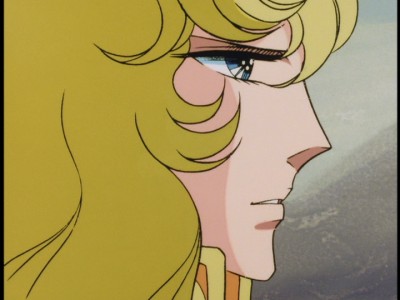
Final Thoughts:
The second half of The Rose of Versailles is just as much of a mixed effort when it comes to overall quality and historical accuracy. Director Dezaki doesn't try to make the show all that historically sound, but the show does have an increased sense of energy and enthusiasm and creativity that makes these episodes a bit more interesting. It's also intriguing to see a anime series portraying (accurately or not!) the French revolution, which is the main element that becomes focused on in concluding the show (besides character-interactions and romances, naturally).
Nozomi's release contains a quality PQ/AQ presentation and a beautiful chipboard art-box which makes this a fancy set that fans will want to purchase. Newcomers should begin the show with a rental of the first set's discs, but established fans who enjoyed set one enough to own will want this collection too. Consider it a 'lightly' recommended release, based on the series own merits artistically. The packaging and care given by Nozomi is impressive throughout and is worth great enthusiasm.
Recommended.
Neil Lumbard is a lifelong fan of cinema. He aspires to make movies and has written two screenplays on spec. He loves writing, and currently does in Texas.
|
| Popular Reviews |
| Sponsored Links |
|
|
| Sponsored Links |
|
|
| Release List | Reviews | Shop | Newsletter | Forum | DVD Giveaways | Blu-Ray | Advertise |
|
Copyright 2024 DVDTalk.com All Rights Reserved. Legal Info, Privacy Policy, Terms of Use,
Manage Preferences,
Your Privacy Choices | |||||||









